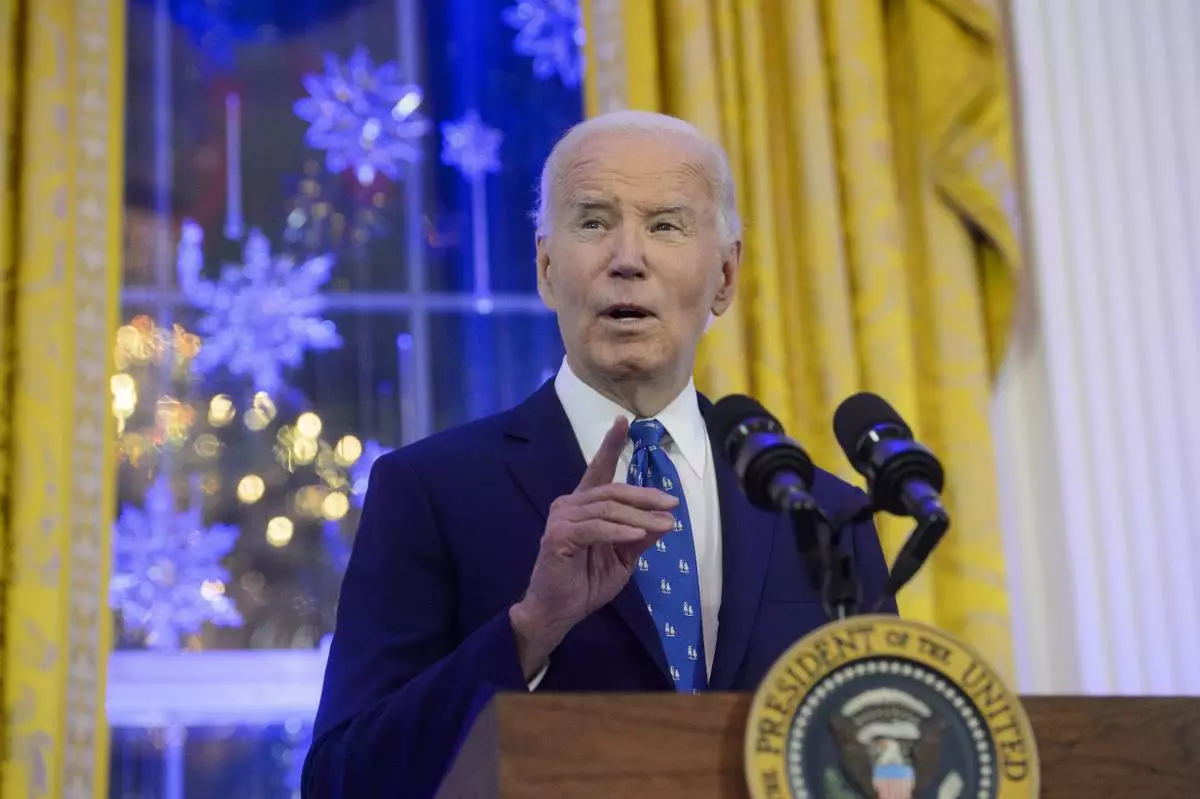MONTEVIDEO, Uruguay (AP) — Peñarol had a 0-0 draw at home against Brazil´s Flamengo on Thursday to secure a spot in the Copa Libertadores semifinals for the first time in 13 years.
The Uruguayan club won the first leg 1-0 via a Javier Cabrera goal.
Click to Gallery
Gerson of Brazil's Flamengo, right, and Maximiliano Olivera of Uruguay's Penarol battle for the ball during a Copa Libertadores quarter final second leg soccer match at Campeon del Siglo Stadium in Montevideo, Uruguay, Thursday, Sept. 26, 2024. (AP Photo/Matilde Campodonico)
Maximiliano Silvera of Uruguay's Penarol , front, and Wesley Franca of Brazil's Flamengo battle for the ball during a Copa Libertadores quarter final second leg soccer match at Campeon del Siglo Stadium in Montevideo, Uruguay, Thursday, Sept. 26, 2024. (AP Photo/Matilde Campodonico)
Fans of Uruguay's Penarol cheer during a Copa Libertadores quarter final second leg soccer match against Brazil's Flamengo at Campeon del Siglo Stadium in Montevideo, Uruguay, Thursday, Sept. 26, 2024. (AP Photo/Matilde Campodonico)
Gonzalo Plata of Brazil's Flamengo, left, and Jaime Baez of Uruguay's Penarol battle for the ball during a Copa Libertadores quarter final second leg soccer match at Campeon del Siglo Stadium in Montevideo, Uruguay, Thursday, Sept. 26, 2024. (AP Photo/Matilde Campodonico)
Players of Uruguay's Penarol celebrate at the end of a Copa Libertadores quarter final second leg soccer match against Brazil's Flamengo at Campeon del Siglo Stadium in Montevideo, Uruguay, Thursday, Sept. 26, 2024. (AP Photo/Matilde Campodonico)
Maximiliano Olivera of Uruguay's Penarol, celebrates at the end of a Copa Libertadores quarter final second leg soccer match against Brazil's Flamengo at Campeon del Siglo Stadium in Montevideo, Uruguay, Thursday, Sept. 26, 2024. (AP Photo/Matilde Campodonico)
Peñarol will next play Botafogo, which beat Sao Paulo on penalties in an all-Brazil quarterfinal to reach the last four for the first time since 1973.
Five-time champion Peñarol has struggled in the last decade in the Copa Libertadores with group-stage exits in its previous nine appearances. The Uruguayans haven't reached this stage since a run to the final in 2011.
Peñarol was an underdog against Flamengo, which spent more than $50 million in the offseason attempting to build a team capable of earning the club a fourth Copa Libertadores title.
In the other semifinal, Argentina’s River Plate will play against Brazil’s Atletico Mineiro.
The Copa Libertadores final is scheduled for Nov. 30 in Buenos Aires. It's the home of River Plate, which advanced over Chile’s Colo Colo. Atletico Mineiro defeated defending champion Fluminense 2-0 to reach the semifinals.
River Plate is led by coach Marcelo Gallardo, who returned after a brief stint with the Al-Ittihad in Saudi Arabia. Gallardo won Copa Libertadores titles with River Plate in 2015 and 2018.
AP soccer: https://apnews.com/hub/soccer

Gerson of Brazil's Flamengo, right, and Maximiliano Olivera of Uruguay's Penarol battle for the ball during a Copa Libertadores quarter final second leg soccer match at Campeon del Siglo Stadium in Montevideo, Uruguay, Thursday, Sept. 26, 2024. (AP Photo/Matilde Campodonico)

Maximiliano Silvera of Uruguay's Penarol , front, and Wesley Franca of Brazil's Flamengo battle for the ball during a Copa Libertadores quarter final second leg soccer match at Campeon del Siglo Stadium in Montevideo, Uruguay, Thursday, Sept. 26, 2024. (AP Photo/Matilde Campodonico)

Fans of Uruguay's Penarol cheer during a Copa Libertadores quarter final second leg soccer match against Brazil's Flamengo at Campeon del Siglo Stadium in Montevideo, Uruguay, Thursday, Sept. 26, 2024. (AP Photo/Matilde Campodonico)

Gonzalo Plata of Brazil's Flamengo, left, and Jaime Baez of Uruguay's Penarol battle for the ball during a Copa Libertadores quarter final second leg soccer match at Campeon del Siglo Stadium in Montevideo, Uruguay, Thursday, Sept. 26, 2024. (AP Photo/Matilde Campodonico)

Players of Uruguay's Penarol celebrate at the end of a Copa Libertadores quarter final second leg soccer match against Brazil's Flamengo at Campeon del Siglo Stadium in Montevideo, Uruguay, Thursday, Sept. 26, 2024. (AP Photo/Matilde Campodonico)

Maximiliano Olivera of Uruguay's Penarol, celebrates at the end of a Copa Libertadores quarter final second leg soccer match against Brazil's Flamengo at Campeon del Siglo Stadium in Montevideo, Uruguay, Thursday, Sept. 26, 2024. (AP Photo/Matilde Campodonico)
WASHINGTON (AP) — President Joe Biden on Monday signed into law a defense bill that authorizes significant pay raises for junior enlisted service members, aims to counter China's growing power and boosts overall military spending to $895 billion despite his objections to language stripping coverage of transgender medical treatments for children in military families.
Biden said his administration strongly opposes the provision because it targets a group based on gender identity and "interferes with parents’ roles to determine the best care for their children.” He said it also undermines the all-volunteer military's ability to recruit and retain talent.
“No service member should have to decide between their family’s health care access and their call to serve our nation,” the president said in a statement.
The Senate forwarded the bill to Biden after passing it last week by a vote of 85-14. In the House, a majority of Democrats voted against the bill after House Speaker Mike Johnson insisted on adding the provision to ban transgender medical care for children. The legislation easily passed by a vote of 281-140.
Biden also objected to other language in the bill prohibiting the use of money earmarked to transfer detainees held at Guantanamo Bay, Cuba, to some foreign countries and into the United States. He urged Congress to lift those restrictions.
The annual defense authorization bill, which directs Pentagon policy, provides a 14.5% pay raise for junior enlisted service members and a 4.5% increase for others.
The legislation also directs resources towards a more confrontational approach to China, including establishing a fund that could be used to send military resources to Taiwan in much the same way that the U.S. has backed Ukraine. It also invests in new military technologies, including artificial intelligence, and bolsters the U.S. production of ammunition.
The U.S. has also moved in recent years to ban the military from purchasing Chinese products, and the defense bill extended that with prohibitions on Chinese goods from garlic in military commissaries to drone technology.
The legislation still must be backed up with a spending package.
__
Associated Press writer Stephen Groves contributed to this report.

President Joe Biden speaks during a Hanukkah reception in the East Room of the White House in Washington, Monday, Dec. 16, 2024. (AP Photo/Rod Lamkey, Jr.)






















